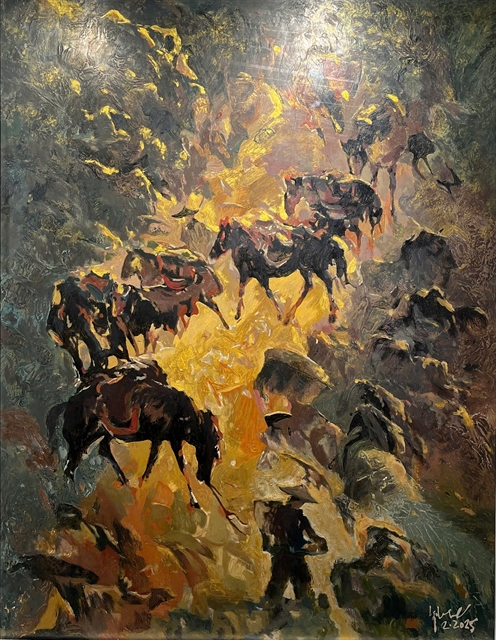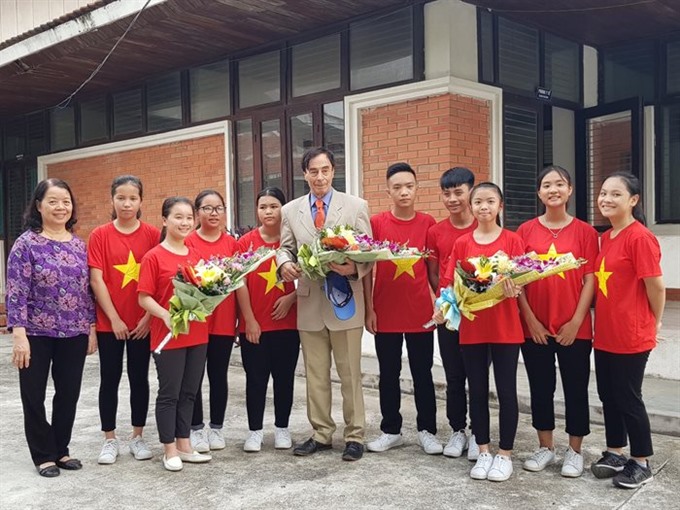

Many children were left as orphans when their parents were killed during the American War. This led to the start of the SOS villages for children in Việt Nam.
 |
| Inspiring: Professor Odon Vallet poses for a photo with students from an SOS Village. |
This led to the start of the SOS villages for children in Việt Nam.
The villages live on today but are always in need of help to keep going.
Supporters from France have said they will carry on supporting the villages with funds.
By Hà Nguyễn
Professors Trần Thanh Vân and Lê Kim Ngọc from France have pledged to continue their support for SOS Vietnamese children, particularly those in Huế, until 2020, says director Nguyễn Thị Kim Dung.
The couple and their friend Prof Odon Vallet have also committed to promote the Vallet scholarship programme for excellent Vietnamese students including those from Việt Nam’s 17 SOS villages, she says.
Vân is chairman of the Meeting Việt Nam Organisation and his wife Ngọc is the founder and chairwoman of the Association for Protection of Vietnamese Children (Aide à l’Enfance du Vietnam - AEVN) which she established to help build SOS villages in Việt Nam.
Văn Thị Cháu, 63, was one of the first ‘mothers’ at the Huế SOS Village to teach and raise SOS children. They include Bùi Văn Phố, who has just successfully defended his PhD thesis on nanotechnology at Japan’s Osaka University at the age of 30.
Phố says thanks to the SOS Village and Cháu who taught him life skills, how to love people, to learn and to work, he has become a successful person and earns a high wage.
Vân recalls during the American War in Việt Nam, hundreds of Vietnamese children became orphans, so in France "we realised we would have to help them. We came up with the idea of building an SOS village for them. But at that time the idea was considered ‘crazy’."
Vân and Ngọc were famous scientists in France during the 1970s, and volunteered to go around the streets of Paris to sell cards and collect money in an effort to build an SOS village in Việt Nam.
The couple’s example was soon followed by their friends and students as well as French people, creating a strong movement in France that spread to the US.
The initial success of selling cards encouraged the couple to set up an association to help Vietnamese children. That’s how the AEVN came into being attracting 400 members, most of them French.
They made a profit of US$1 from each card they sold. As a result, after three years, they had made $1 million to invest in an SOS village in Việt Nam.
After their first SOS Village in Đà Lạt. The AEVN continued to build other orphanages in Huế and Quảng Bình.
Hundreds of orphans have grown up and gone on to greater things thanks to the villages built by the loving couple.
Ngọc says: “We are trying to do small things from our hearts for unfortunate Vietnamese children. Money and fame can disappear like smoke but love and kindness last forever.”
Helmut Kutin, chairman of the International Union of SOS Villages, says: “The AEVN is a member of our union. I met the couple in Paris when we were all young. As renowned scientists in France, they could relax after a day at the office, but instead they volunteered to sell cards on the streets to raise money to build these SOS villages," Kutin says.
“I always remind local authorities not to waste a dollar building these villages because the couple and their AEVN members had to work very hard to sell millions of cards for fundraising.”
To date, SOS villages have spread to 17 provinces and cities. These villages are raising nearly 6,000 children. The country also has 16 SOS kindergartens for 44,300 children and 12 primary schools for nearly 200,000 students and others for SOS vocational school students, says Đỗ Tiến Dũng, director of the Việt Nam National SOS Village.
Apart from injecting money into SOS villages, as a friend of Vallet, Vân has convinced French professor Vallet, who inherited 100 million euros from his family, to offer scholarships for excellent students in France, Benin and Việt Nam.
This year is the 18th years the Vallet scholarships have been awarded to more than 500 Vietnamese students, with a total amounting to VNĐ26 billion, bringing the total so far to VNĐ 350 billion for nearly 30,000 students.
Deputy Minister of Labour, Invalids and Social Affairs Đào Hồng Lam says: “ We highly appreciate the great contribution made by the couple to help and protect Vietnamese children.”
Furthermore, the couple established a scientific association named Meeting Việt Nam in 1993, aiming to help Việt Nam to promote science and education. In 2013 they invested money to build the International Centre for Interdisciplinary Science and Education (ICISE) in Bình Định’s Quy Nhơn City. The centre aims to help students and young Asian scientists meet and discuss ways to integrate with the international science circle.
Deputy chairman of Bình Định’s People’s Committee Nguyễn Phi Long says his province has vowed to support the ICISE to become a destination for local and international scientists.
Meanwhile in France, Catherine Monte, vice chairwoman of Blois City, says: “Thanks to Vân’s establishment of the Blois Meeting Conferences, the city has become known around the world for its ancient traditions and rich culture, and also a city of science with many renowned scientists that has helped us promote tourism and economic activities.
“Thanks to this couple, each year we welcome 20-25 Vietnamese students to study in our city. I admire these students because many of them are top of their classes and take part in local community activities,” Monte said.
Vietnamese Ambassador to France Nguyễn Ngọc Sơn says: “Vân and Ngọc are among the most outstanding overseas Vietnamese who have focused on building, caring and encouraging a scientific passion among young people.”
Born in Quảng Bình Province’s Đồng Hới District in 1936, Vân studied in Huế and then travelled to France to continue his studies there. He held a doctorate in physics in 1963 with his scheme on the structure of protons and quarks. He was also one of three Asians awarded the Tate Order by the US Physics Association in 2012.
Ngọc discovered thin cell layers, a turning point for technology on biology and plants. She had been awarded the Legion of Honour by the French Government.
Over the past 40 years, the couple have tirelessly contributed to the protection and care of Vietnamese children.
As a result, the Government have awarded them the Friendship Medals and certificates of merit to recognise their contributions to the country. VNS
GLOSSARY
Professors Trần Thanh Vân and Lê Kim Ngọc from France have pledged to continue their support for SOS Vietnamese children, particularly those in Huế, until 2020, says director Nguyễn Thị Kim Dung.
Pledged means promised.
The couple and their friend Prof Odon Vallet have also committed to promote the Vallet scholarship programme for excellent Vietnamese students including those from Việt Nam’s 17 SOS villages, she says.
To be committed to something means to be loyal to the idea of doing it and therefore carrying it out and not giving up on it after losing interest in it.
To promote something means to say good things about it and make it stronger.
Vân is chairman of the Meeting Việt Nam Organisation and his wife Ngọc is the founder and chairwoman of the Association for Protection of Vietnamese Children (Aide à l’Enfance du Vietnam - AEVN) which she established to help build SOS villages in Việt Nam.
Trần Thanh Vân is the founder of the association because she started it.
They include Bùi Văn Phố, who has just successfully defended his PhD thesis on nanotechnology at Japan’s Osaka University at the age of 30.
PhD stands for “doctorate in Philosophy”, which is a doctorate degree in any one of a range of subjects.
A thesis is a project that people do as part of getting certain qualifications.
Nanotechnology is a branch of science that deals with certain issues that relate to tiny things, such as atoms and molecules.
Vân and Ngọc were famous scientists in France during the 1970s, and volunteered to go around the streets of Paris to sell cards and collect money in an effort to build an SOS village in Việt Nam.
When people volunteer, they do work without expecting to be paid for it.
The initial success of selling cards encouraged the couple to set up an association to help Vietnamese children.
Initial means first.
As a result, after three years, they had made $1 million to invest in an SOS village in Việt Nam.
When you invest in something, you put resources, such as money, into it in the hope of getting something better out of it, which may or may not be more money. It could be the success of orphans one day becoming successful people.
“As renowned scientists in France, they could relax after a day at the office, but instead they volunteered to sell cards on the streets to raise money to build these SOS villages," Kutin says.
Renowned means famous.
The country also has 16 SOS kindergartens for 44,300 children and 12 primary schools for nearly 200,000 students and others for SOS vocational school students, says Đỗ Tiến Dũng, director of the Việt Nam National SOS Village.
Vocational schools are schools that train people to do a physical job.
Apart from injecting money into SOS villages, as a friend of Vallet, Vân has convinced French professor Vallet, who inherited 100 million euros from his family, to offer scholarships for excellent students in France, Benin and Việt Nam.
Injecting money into the villages means putting money into them, the same way medicine is put into someone’s body with an injection.
If you inherit money, it is left to you by someone who has died and chose that you should have it.
A scholarship is an award given to someone to pay for their studies.
The centre aims to help students and young Asian scientists meet and discuss ways to integrate with the international science circle.
To integrate means to become part of something.
Deputy chairman of Bình Định’s People’s Committee Nguyễn Phi Long says his province has vowed to support the ICISE to become a destination for local and international scientists.
Vowed means promised.
A destination is a place you travel to.
He held a doctorate in physics in 1963 with his scheme on the structure of protons and quarks.
Protons and quarks are little particles that are in atoms.
WORKSHEET
State whether the following sentences are true or false:
© Duncan Guy/Learn the News/ Viet Nam News 2019
1. True; 2. False; 3. True; 4. False; 5. True.